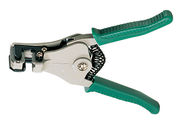Difference between revisions of "Wire Strippers/Crimpers"
m |
m (4 revisions) |
||
| (One intermediate revision by one other user not shown) | |||
| Line 10: | Line 10: | ||
Anyone who is serious about this hobby/wiring should consider investing in at least an automatic, spring loaded wire stripper that can strip a few wires at a time...these really save a lot of time. | Anyone who is serious about this hobby/wiring should consider investing in at least an automatic, spring loaded wire stripper that can strip a few wires at a time...these really save a lot of time. | ||
| + | |||
| + | ==See Also== | ||
| + | * [[Building]] | ||
| + | |||
| + | [[Category:Building]] | ||
Latest revision as of 09:58, 5 December 2013
Wire strippers are used to strip the insulation off the ends the wire you will use to connect your controls. They should have multiple "settings" to strip many different sizes of wire. The number for each "setting" refers to the AWG size of the wire you purchase. Some wire strippers have a crimper built in, but may require more force to remove the insulation. An example of this type of wire stripper is shown in the upper right-hand picture.
A second style of wire stripper slices the insulation more precisely and removes it in one step. This type of wire stripper greatly speeds up the process, but drawbacks are the cost of such a unit and generally lacks the ability to crimp your connectors. A needlenose pliers may be used to crimp your connectors if you choose to go this route. This type of wire stripper is shown in the lower right-hand picture.
Anyone who is serious about this hobby/wiring should consider investing in at least an automatic, spring loaded wire stripper that can strip a few wires at a time...these really save a lot of time.

